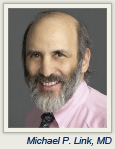While the process of finding permanent solutions to the shortage of oncology drugs continues, physicians and patients may still face difficult situations when certain drugs, possibly part of curative regimens, are not available.
“The key thing is that we urge patients to have discussions with their physicians in terms of whether they are even affected,” ASCO President Michael P. Link, MD, advised.
Specifically, physicians should discuss with their patients the following issues:
Does the regimen that the patient is on include a drug that has ever been in short supply?
Is that drug in short supply where the patient is being treated?
“Sometimes a drug is in short supply nationally or we know it is in short supply in different places, but not particularly where the patient is being treated,” Dr. Link said. “Even if it is in short supply, for some of these cancers there is a very appropriate workaround—an alternative drug that isn’t in short supply—and therefore, the patient need not worry.”
For patients, the message should be “not to get stressed out at a time when you are already very stressed out,” Dr. Link counseled. “Try to discuss these issues with your oncologist to see how it affects individuals, if at all.” ■

 “We should...
“We should...